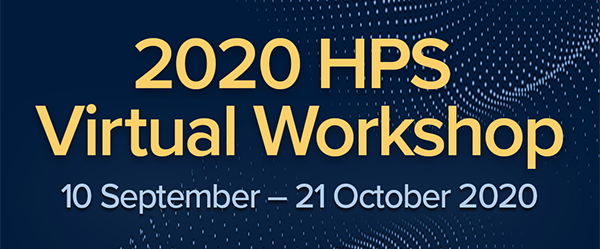News Archive
 The verdict is in: the 2020 Health Physics Society (HPS) Virtual Workshop is a success! (The workshop is being held in place of the annual meeting.) We've had many great sessions and presenters so far and there are many more still on the schedule. If you have not already, it's not too late to register for sessions.
The verdict is in: the 2020 Health Physics Society (HPS) Virtual Workshop is a success! (The workshop is being held in place of the annual meeting.) We've had many great sessions and presenters so far and there are many more still on the schedule. If you have not already, it's not too late to register for sessions.
Upcoming sessions
1 October – Special Session: Rad NESHAPs
This year's Radioactive Air—National Emissions Standards for Hazardous Air Pollutants (NESHAPs), Subpart H, session offers an opportunity for regulators, federal employees and contractors, and industry to meet virtually and hear presentations and ask questions on this program. The session features overview presentations from the Environmental Protection Agency and the Department of Energy and a standards update on radioactive airborne emissions. Technical presentations will include addressing onsite members of the public, long-term exhaust air monitoring at the Waste Isolation Pilot Plant, and a presentation on compliance codes including CAP88-PC and COMPLY. At the end of the session there will be additional time for questions and answers.
6 October – Technical Session 2
This session includes Internal Dosimetry, External Dosimetry, Dose Reconstruction, Medical Health Physics, and Academic Institutions. The session is filled with heavy hitters in the health physics world, several current or past HPS officers, and exceptional topics. Attendees interested in space and airplane radiation safety and Lutathera treatments, or anyone who just wants to know what is relevant in the health physics community, should not miss this session.
8 October – Special Session: Academic, Industrial, and Research Radiation Safety Section (AIRRS)
The Accelerator Section is hosting a diverse set of presentations on a number of accelerator radiation safety topics from section members representing SLAC National Accelerator Lab, Jefferson Lab, the National Institute of Standards and Technology, and NorthStar Medical Radioisotopes, LLC. The topics include important perspectives on developing robust safety programs for accelerators. They also address several unique radiation safety challenges associated with medical radioisotope production, release protocols for potentially activated materials, management of TRU and non-TRU alpha emitters in accelerator experiments, and environmental monitoring for very low levels of prompt ionizing radiation. You are invited to share in this wealth of knowledge and interact with the accelerator radiation safety experts who are presenting. The Accelerator Section also welcomes you to its annual business meeting immediately following the topical session.
13 October – Special Session: Nonionizing Radiation Section (NIR)
This session includes Management of Outside Laser Devices; Beyond the Door Interlock: Considerations in Design of Interlocks for High-Powered Lasers; Radiofrequency Safety—What a Health Physicist Needs to Know; The RF Relative Risk Index—A Novel Approach for Assessment and Comparison of the Relative Risk of Sources of Radiofrequency (RF) Energy; What Health Physicists Should Know About 5G, and 5G Network Overview.
15 October – Special Session: American Academy of Health Physics (AAHP) Therapy Patient Release Issues
Radiopharmaceutical therapy is a much-needed treatment for cancer patients. Therapies are increasing in frequency and there are novel compounds that are undergoing research and clinical trials. Most patients are able to be treated and released on an outpatient basis if they meet regulatory limits. There are many ways to achieve compliance in this area and these papers provide information from a variety of viewpoints. Presentations will provide an overview of operational experiences using National Council on Radiation Protection and Measurements Report 155 guidance and pretreatment screening. Also included from the regulatory side of operations are presentations from the Nuclear Regulatory Commission (NRC) perspective, from the NRC staff, and from the Advisory Committee on the Medical Use of Isotopes (ACMUI). Finally, a presentation will describe an online resource for patient release estimates. The American Academy of Health Physics is also partnering with the Medical Health Physics Section of the HPS on this important topic. We look forward to seeing you online.
20 October – Medical Health Physics Radiation Safety Culture
This session includes the topics IRPA, WHO, IAEA, IOMP Radiation Safety Culture in Health Care; Radiation Safety Culture Challenges in Hospitals; Radiation Safety Myths and Misconceptions in Health Care—Impacts on Safety Culture; Consulting Physicist Perspective on Radiation Safety Culture in Medical Institutions; and Strengthening Radiation Safety Culture in Medicine Through Training, followed by a panel discussion and business meeting.
Upcoming PEPs
PEP 10/5 – Radiofrequency Safety—What a Health Physicist Needs to Know (Gregory R. Komp)
PEP 10/7 – Operating Nonmedical X-Ray Devices—A Roller Coaster Asset (Carl Tarantino)
PEP 10/12 – Nonionizing Radiation: An Overview of Biological Effects and Exposure Limits (Ben Edwards)
PEP 10/14 – Radiation Biology for Radiation Protection in Medicine (Kathryn D. Held)
PEP 10/19 – Is Individualized Patient Dosimetry in Radiological Procedures Necessary? (Caridad Borrás)
PEP 10/21 – Harmony in Concepts and Units for Internal Dose Calculations for Nuclear Medicine Applications or for Protection of Radiation Workers (Mike Stabin)




